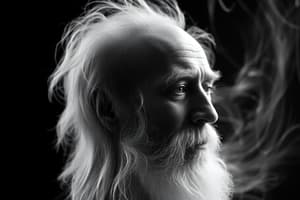Podcast
Questions and Answers
What does the word 'psychology' derive from?
What does the word 'psychology' derive from?
Greek words ‘psyche’ meaning ‘soul’ and ‘logos’ meaning ‘the study of’.
What are the primary goals of psychology?
What are the primary goals of psychology?
- Describe
- Explain
- Predict
- Control
- All of the above (correct)
Who conceptualized the Self-Concept?
Who conceptualized the Self-Concept?
Carl Rogers
The 'Me' refers to the empirical self in psychology.
The 'Me' refers to the empirical self in psychology.
What does the term 'Collective Unconscious' refer to?
What does the term 'Collective Unconscious' refer to?
The __________ is the feminine side of men according to Jung.
The __________ is the feminine side of men according to Jung.
Match the following concepts with their descriptions:
Match the following concepts with their descriptions:
Who developed the Self-Discrepancy Theory?
Who developed the Self-Discrepancy Theory?
What does the term 'Shadow' refer to in Jungian psychology?
What does the term 'Shadow' refer to in Jungian psychology?
Winnicott suggested that play is significant in the development of the child.
Winnicott suggested that play is significant in the development of the child.
What is the main function of the false self according to Winnicott?
What is the main function of the false self according to Winnicott?
Flashcards are hidden until you start studying
Study Notes
Psychology
- Derived from Greek words "psyche" (soul) and "logos" (study of)
- Study of human behavior and mental processes, encompassing biological, social, and environmental factors
- Focuses on how people think, act, and feel
Goals of Psychology
- Describe: Observe and identify patterns in behavior
- Explain: Understand the causes and mechanisms of behavior
- Predict: Anticipate future behavior based on existing knowledge
- Control: Influence behavior to improve well-being
Biopsychosocial Approach
- Integrates biological, psychological, and socio-cultural levels of analysis to understand behavior
Carl Gustav Jung (1875-1955)
- Swiss psychiatrist and psychoanalyst
- Developed Analytical Psychology, which explores the influence of the unconscious mind on behavior
- Proposed the concept of the "Collective Unconscious" – a shared, inherited reservoir of archetypes
- Archetypes are universal symbols and patterns found in the unconscious mind
Archetypes
- Persona: The public face we present to the world
- Shadow: The dark and unconscious side of personality, containing repressed aspects
- Anima: The feminine archetype in men, influencing emotions and feelings
- Animus: The masculine archetype in women, influencing rational thinking and opinions
- The Great Mother: Associated with fertility and destruction
- The Wise Old Man: Represents wisdom and meaning, symbolizing our innate knowledge of life's mysteries
- The Hero: Represents someone who overcomes challenges but has a tragic flaw
- Self: The archetype of wholeness and completeness, symbolizing our potential for integration
William James (1842-1910)
- American philosopher and psychologist
- Considered the "Father of American Psychology"
- Introduced psychology as a subject in the United States
- Developed the Theory of the Self, which divides the self into the "Me" and the "I"
Concept of Self
- "Me": The empirical self, the one who acts and experiences the world
- "I": The self that thinks and reflects
Self-Concept:
- Conceptualized by Carl Rogers
- How a person thinks or perceives themself
- Real Self-Concept: Information and perceptions about oneself
- Ideal Self-Concept: The version of oneself that one wishes to be
Self-Discrepancy Theory:
- Developed by Edward Tory Higgins
- Individuals compare their "actual self" to internalized standards (ideal self or ought self).
Self-Discrepancy Components:
- Actual Self: Attributes one believes they possess
- Ideal Self: Attributes one desires to possess
- Ought Self: Attributes one believes they should possess
True and False Selves:
- Donald Woods Winnicott, an English pediatrician and psychoanalyst
- Play is crucial for child development
- True Self: A sense of being alive and genuine, experiencing spontaneous feelings
- False Self: A defensive mask, complying with expectations to protect the true self
The Self as Proactive and Agentic:
- Albert Bandura, a Canadian-American psychologist
- Social Cognitive Theory: Individuals learn by observing others
- Emphasizes the role of agency, self-efficacy and self-regulation in shaping human experience
Studying That Suits You
Use AI to generate personalized quizzes and flashcards to suit your learning preferences.




